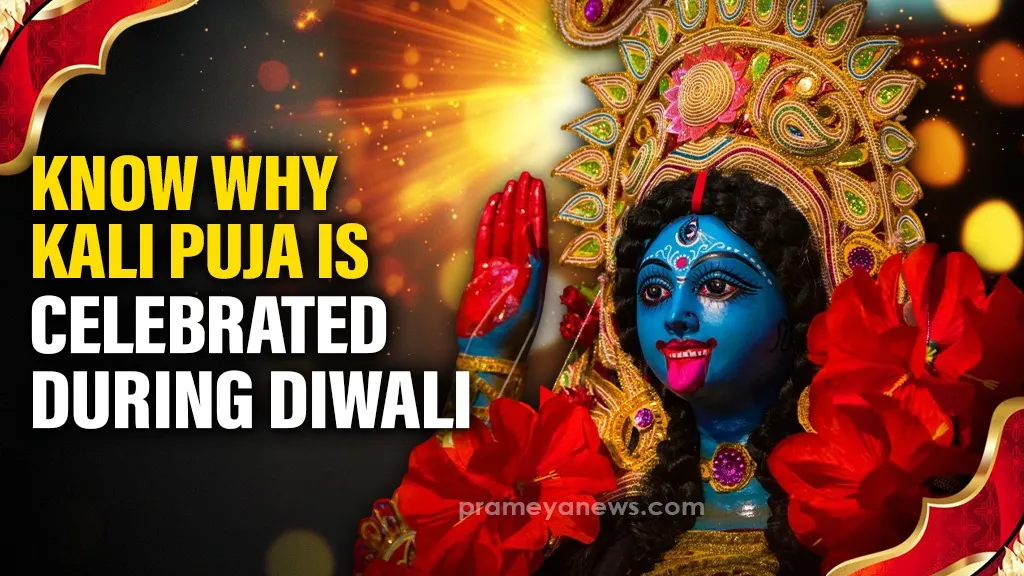

Diwali, the festival of lights, is one of the most eagerly awaited celebrations in India, marking the triumph of light over darkness and good over evil. While the central focus of Diwali revolves around the worship of Goddess Lakshmi, the deity of wealth, prosperity, and abundance there is another powerful and equally significant goddess who is venerated during this auspicious time: Goddess Kali. Kali Puja, which coincides with Diwali, holds deep spiritual significance and offers a unique perspective on the festival, celebrating not just material abundance but spiritual transformation and liberation.
Unique confluence of Kali Puja & Diwali
Kali Puja is observed on the New Moon Day (Dipannita Amavasya) in the Hindu month of Kartik, which typically falls around the same time as Diwali. This overlap between the two major festivals is not coincidental, as both are rooted in deep spiritual and mythological significance. The timing of Kali Puja during Diwali creates a special convergence—while Diwali itself is a celebration of light and prosperity, Kali Puja adds an element of fierce transformation, strength, and liberation.
Diwali is primarily associated with the worship of Goddess Lakshmi, who is invoked to bring wealth, happiness, and good fortune. In contrast, Kali Puja honors Goddess Kali, who represents the darker, more intense aspects of existence—destruction, the annihilation of evil, and the power to overcome fear and ignorance. The dual celebration during Diwali highlights the balance between light and dark, good and evil, material success and spiritual growth.
Spiritual significance of Kali Puja
Kali Puja is a time when devotees invoke the fierce, transformative energy of Goddess Kali to overcome personal struggles, internal conflicts, and obstacles. While Diwali emphasizes the arrival of light and positivity into one's life, Kali Puja reminds us that true spiritual progress comes from confronting and transforming the darkness within.
In Hindu mythology, Goddess Kali is often depicted as a dark-skinned, fierce figure adorned with a garland of skulls and a protruding tongue, symbolizing the destruction of ego, ignorance, and all negative influences. Kali is not merely a goddess of destruction; she represents the creative force that clears the way for renewal and growth. It is believed that by worshiping Kali, devotees can break free from the chains of fear, attachment, and negativity, paving the way for spiritual liberation.
Connection to the victory of Good over Evil
One of the most important legends associated with Kali Puja is the story of her battle against the demon Raktabija. This demon had the power to regenerate each time a drop of his blood fell to the ground, making him an almost invincible adversary. Kali, in her fierce form, defeated Raktabija by drinking his blood and preventing his regeneration, symbolizing the triumph of good over evil. This story aligns perfectly with the central theme of Diwali, which celebrates the victory of Lord Rama over the demon king Ravana, further reinforcing the significance of Kali Puja during this time.
Kali Puja, therefore, becomes a ritual of empowerment—devotees turn to the goddess to seek protection from negative forces, be they external threats or the darker aspects of the self. It is a celebration of inner strength and the courage to face and conquer one's personal demons.
Why is Kali Puja important during Diwali?
The celebration of Kali Puja during Diwali serves as a reminder that spiritual growth involves both light and darkness. While Diwali encourages us to celebrate the joys of life and the blessings of material prosperity, Kali Puja urges us to look inward and confront our fears, doubts, and limitations. It teaches us that, just as darkness is necessary to appreciate light, the challenges and struggles we face are essential for personal growth and spiritual awakening.
By observing Kali Puja, devotees honor not just material success but the deeper, spiritual victories that come from inner transformation. It is a time to let go of old patterns, negative thoughts, and past traumas, and embrace the fierce, transformative energy of Goddess Kali to renew and empower oneself.
A celebration of divine feminine energy
The dual celebration of Diwali and Kali Puja highlights the richness of the divine feminine in Hinduism. While Goddess Lakshmi is worshipped as a symbol of abundance, prosperity, and gentleness, Goddess Kali represents a raw, unfiltered, and powerful energy that clears the path for transformation. Both goddesses embody different aspects of feminine power Lakshmi, the nurturing mother, and Kali, the fierce warrior and their simultaneous worship during Diwali offers a balanced view of the divine feminine in its full spectrum.
Kali Puja is celebrated during Diwali not only because the two festivals coincide in the lunar calendar, but also because the combination of both celebrations emphasizes the dual nature of existence. While Diwali focuses on light, prosperity, and the external world, Kali Puja invites devotees to confront the darkness within and seek spiritual liberation. Together, these two festivals offer a holistic celebration of both the material and spiritual dimensions of life, encouraging individuals to embrace both the joy of abundance and the transformative power of inner strength.
Thus, the worship of Goddess Kali during Diwali is a powerful reminder that true prosperity and success are not just measured in wealth but in our ability to conquer adversity, transcend limitations, and ultimately achieve spiritual freedom.